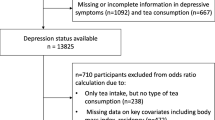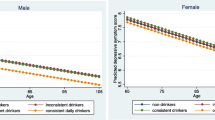Abstract
Objectives
Experimental evidence suggest that tea polyphenols have anti-depressant effect and tea consumption may reduce the risk and severity of depression. We investigated whether tea consumption was associated with changes in depressive symptoms over time among Asian older adults.
Design
Population-based prospective cohort study with mean 4 years of follow up.
Setting
Singapore Longitudinal Ageing Study (SLAS) of community-living older persons.
Participants
3177 participants overall (mean age 67 years) and 3004 participants who were depression-free at baseline.
Measurements
Baseline tea consumption which include Chinese (black, oolong or green) tea or Western (mixed with milk) tea and change in Geriatric Depression Scale (GDS) measure of depression. Incident depression was defined by GDS≥5, and GDS depression improvement or deterioration by GDS change of ≥4 points. Estimated odds ratio and 95% confidence intervals (OR, 95%CI) were adjusted for baseline age, sex, ethnicity, education, housing type, single/divorced/widowed, living alone, physical and social activity, smoking, alcohol, number of comorbidities, MMSE, and baseline GDS level.
Results
Compared to non-tea drinkers, participants who consumed ≥3 cups of tea of all kinds were significantly less likely to have worsened GDS symptoms: OR=0.32, 95% CI=0.12, 0.84. Among baseline depression-free participants, the risk of incident GDS (≥5) depression was significantly lower (OR=0.34, 95%CI=0.13, 0.90) for daily consumption of all types of tea, and Chinese (black, oolong or green) tea (OR=0.46, 95%CI=0.21,0.99).
Conclusion
This study suggests that tea may prevent the worsening of existing depressive symptoms and the reduce the likelihood of developing threshold depression.


Similar content being viewed by others
References
WHO, 2008. The Global Burden of Disease: 2004 Update; Technical Report for Health Statistics and Information Systems. Geneva, Switzerland
WHO (2017. Mental Health of Older Adults. http://www.who.int/news-room/factsheets/detail/mental-health-of-older-adults. Accessed 02 Jun 2018
Siddiqui IA, Afaq F, Adhami VM, Ahmad N, Mukhtar H. Antioxidants of the beverage tea in promotion of human health. Antioxid. Redox Signal 2004;6:571–582
Rothenberg DO, Zhang L. Mechanisms Underlying the Anti-Depressive Effects of Regular Tea Consumption. Nutrients 2019;11:1361. doi:https://doi.org/10.3390/nu11061361
Zhu WL, Shi HS, Wei YM, Wang SJ, Sun CY, Ding ZB, Lin L. Green tea polyphenols produce antidepressant-like effects in adult mice. Pharmacological research 2012;65:74–80
de la Garza AL, Garza-Cuellar MA, Silva-Hernandez IA, Cardenas-Perez RE, Reyes-Castro LA, Zambrano E, Gonzalez-Hernandez B, Garza-Ocanas L, Fuentes-Mera L, Camacho A. Maternal Flavonoids Intake Reverts Depression-Like Behaviour in Rat Female Offspring. Nutrients 2019;11:572. doi:https://doi.org/10.3390/nu11030572
Pervin M, Unno K, Ohishi T, Tanabe H, Miyoshi N, Nakamura Y. Beneficial effects of green tea catechins on neurodegenerative diseases. Molecules 2018;23:1297
Hidese S, Ota M, Wakabayashi C, Noda T, Ozawa H, Okubo T, Kunugi H. Effects of chronic 1-theanine administration in patients with major depressive disorder: an open-label study. Acta neuropsychiatrica 2017;29:72–79
Hidese S, Ogawa S, Ota M, Ishida I, Ysukawa, Z, Ozeki M, Kunugi H. Effects of L-Theanine Administration on Stress-Related Symptoms and Cognitive Functions in Healthy Adults: A Randomized Controlled Trial. Nutrients 2019;11:2362
Nobre AC, Rao A, Owen GN. L-theanine, a natural constituent in tea, and its effect on mental state. Asia Pac J Clin Nutr 2008;17:167–168
Dong X, Yang C, Cao S, Gan Y, Sun H, Gong Y, Yang H, Yin X, Lu Z (2015) Tea consumption and the risk of depression: a meta-analysis of observational studies. Aust N Z J Psychiatry 20154;9:334–345
Grosso G, Micek A, Castellano S, Pajak A, Galvano F (2016) Coffee, tea, caffeine and risk of depression: A systematic review and dose-response meta-analysis of observational studies. Mol Nutr Food Res 2016;60:223–234
Niu K, Hozawa A, Kuriyama S, Ebihara S, Guo H, Nakaya N, Ohmori-Matsuda K, Takahashi H, Masamune Y, Asada M, Sasaki S, Arai H, Awara S, Nagatomi R, Tsuji I. Green tea consumption is associated with depressive symptoms in the elderly. Am J Clin Nutr 2009;90:1615–1622
Ruusunen A, Lehto SM, Tolmunen T, Mursu J, Kaplan GA, Voutilainen S. Coffee, tea and caffeine intake and the risk of severe depression in middle-aged Finnish men: the Kuopio Ischaemic Heart Disease Risk Factor Study. Public Health Nutr 2010;13:1215–1220
Feng L, Li J, Kua EH, Lee TS, Yap KB, Rush AJ, Ng TP. Association between tea consumption and depressive symptoms in older Chinese adults. J Am Geriatr Soc 2012;60:2358–2360. doi:https://doi.org/10.1111/jgs.12011
Feng L, Yan Z, Sun B, Cai CZ, Jiang HJ, Kua EH, Ng TP, Qiu CX. Tea consumption and depressive symptoms in older people in rural China. J Am Geriatr Soc 2013;61:1943–1947
Guo X, Park Y, Freedman ND, Sinha R, Hollenbeck AR, Blair A, Chen H. Sweetened beverages, coffee, and tea and depression risk among older US adults. PLoS One 2014;9:e94715. doi:https://doi.org/10.1371/journal.pone.0094715
Pham NM, Nanri A, Kurotani K, Kuwahara K, Kume A, Sato M, Hayabuchi H, Mizoue T. Green tea and coffee consumption is inversely associated with depressive symptoms in a Japanese working population. Public Health Nutr 2014;17:625–633.
Li FD, He F, Ye XJ, Shen W, Wu YP, Zhai YJ, Wang XY, Lin JF. Tea consumption is inversely associated with depressive symptoms in the elderly: A cross-sectional study in eastern China. J Affect Disord 2016;199:157–162.
Kim J, Kim J. Green Tea, Coffee, and Caffeine Consumption Are Inversely Associated with Self-Report Lifetime Depression in the Korean Population. Nutrients 2018;10:1201. doi:https://doi.org/10.3390/nu10091201
Chan SP, Yong PZ, Sun Y, Mahendran JCMW, Qiu C, Ng TP, Kua EH, Feng L. Associations of Long-Term Tea Consumption with Depressive and Anxiety Symptoms in Community-Living Elderly: Findings from the Diet and Healthy Aging Study. J Prev Alzheimers Dis 2018;5:21–25. doi:https://doi.org/10.14283/jpad.2017.20
Shen K, Zhang B, Feng Q. Association between tea consumption and depressive symptom among Chinese older adults. BMC geriatrics 2019;19:246
Pham NM, Nanri A, Kurotani K, Kuwahara K, Kume A, Sato M, Hayabuchi H, Mizoue T. Green tea and coffee consumption is inversely associated with depressive symptoms in a Japanese working population. Public Health Nutr 2014;17:625–633
Feng L, Yan Z, Sun B, Cai C, Jiang H, Kua EH, Ng TP, Qiu C. Tea consumption and depressive symptoms in older people in rural China. J Am Geriatr Soc 2013;61:1943–1947
Cai H, Zheng W, Xiang YB, Xu WH, Yang G, Li H, Shu XO. Dietary patterns and their correlates among middle-aged and elderly Chinese men: A report from the Shanghai Men’s Health Study. Br J Nutr 2007;98:1006–1013
Nechuta S, Shu XO, Li HL, Yang G, Ji BT, Xiang YB, Cai H, Chow WH, Gao YT, Zheng W. Prospective cohort study of tea consumption and risk of digestive system cancers: Results from the Shanghai Women’s Health Study. Am J Clin Nutr 2012;96:1056–1063
Niti M, Yap KB, Kua EH, Tan CH, Ng TP. Physical, social and productive leisure activities, cognitive decline and interaction with APOE-epsilon4 genotype in Chinese older adults. Int Psychogeriatr 2008;11:1–15
Wei K, Nyunt MSZ, Gao Q, Wee SL, Ng TP. Frailty and Malnutrition: Related and Distinct Syndrome Prevalence and Association among Community-Dwelling Older Adults: Singapore Longitudinal Ageing Studies. J Am Med Dir Assoc 2017;18:1019–1028
Nyunt MSZ, Jin AZ, Fones CSL, Ng TP. Criterion-based validity and reliability of the Geriatric Depression Screening Scale (GDS-15) in a large validation sample of community-living Asian older adults. Ageing and Mental Health 2009;13:376–382
Ng TP, Niti M, Chiam PC, Kua EH. Ethnic differences in cognitive performance on Mini-Mental State Examination in Asians. Am J Geriatr Psychiatry 2007;15:130–139
Rashidinejad A, Birch EJ, Sun-Waterhouse D, Everett DW. Addition of milk to tea infusions: Helpful or harmful? Evidence from in vitro and in vivo studies on antioxidant properties. Crit Rev Food Sci Nutr 2017;57:3188–3196
Ryan L, Petit S. Addition of whole, semiskimmed, and skimmed bovine milk reduces the total antioxidant capacity of black tea. Nutr Res 2010;30:14–20
Pan CW, Ma Q, Sun HP, Xu Y, Luo N, Wang P. Tea Consumption and Health-Related Quality of Life in Older Adults. J Nutr Health Aging. 2017;21(5):480–486.
Soh KC, Kumar R, Niti M, Kua EH, Ng TP. Subsyndromal depression in old age: clinical significance and impact. International Psychogeriatrics 2008;20:188–200
Feng L, Yap KB, Kua EH, Ng TP. Depressive symptoms, physician visits and hospitalization among community-dwelling older adults. Int Psychogeriatr 2009;21:568–75
Ho CSh, Jin A, Nyunt MS, Feng L, Ng TP. Mortality rates in major and subthreshold depression: 10-year follow-up of a Singaporean population cohort of older adults. Postgrad Med 2016;128:642–647
Cherubini A, Nisticò G, Rozzini R, Liperoti R, Di Bari M, Zampi E, Ferrannini L, Aguglia E, Pani L, Bernabei R, Marchionni N, Trabucchi M. Subthreshold depression in older subjects: an unmet therapeutic need. J Nutr Health Aging. 2012 Oct;16(10):909–13.
Acknowledgements
We thank the following voluntary welfare organizations for their support: Geylang East Home for the Aged, Presbyterian Community Services, Thye Hua Kwan Moral Society (Moral Neighbourhood Links), Yuhua Neighbourhood Link, Henderson Senior Citizen’s Home, National Trade Union Congress Eldercare Co-op Ltd, Thong Kheng Senior Activity Centre (Queenstown) and Redhill Moral Seniors Activity Centre.
Funding
Funding: This study was supported by research grants from the Agency for Science, Technology and Research (A*STAR) Biomedical Research Council (BMRC Grant 03/1/21/17/214) and Ministry of Health (MOH) National Medical Research Council (NMRC 08/1/21/19/567; NMRC/CG/NUHCS/2010).
Author information
Authors and Affiliations
Contributions
Authors’ Contributions: TPN designed research, wrote paper and had primary responsibility for final content; QG, XYG, DQLC designed and conducted research; TPN analysed data and performed statistical analyses; All authors reviewed and approved the final manuscript for publication.
Corresponding author
Ethics declarations
Conflict of Interest (COI) Statement: The funding sources had no role in the design and conduct of the study: collection, management, analysis, and interpretation of the data; preparation, review, or approval of the manuscript; and decision to submit manuscript for publication. The authors have no potential conflicts of interest.
Ethical Standards: This study was conducted in accordance with the Declaration of Helsinki, and the protocol was approved by the National University of Singapore Institutional Review Board (NUS-IRB; Reference Code: 04–140).
Electronic supplementary material
Rights and permissions
About this article
Cite this article
Ng, T.P., Gao, Q., Gwee, X. et al. Tea Consumption and Depression from Follow Up in the Singapore Longitudinal Ageing Study. J Nutr Health Aging 25, 295–301 (2021). https://doi.org/10.1007/s12603-020-1526-x
Received:
Accepted:
Published:
Issue Date:
DOI: https://doi.org/10.1007/s12603-020-1526-x




